I need Tendermint in one of my projects but have never used it before so I am trying to implement a very simple example from here first: https://docs.tendermint.com/master/tutorials/java.html but in C# (.NET 5.0).
(Download: Minimal Example)
I have created a simple GRPC Service trying to follow the guide as closely as possible:
Startup.cs:
public class Startup
{
public void ConfigureServices(IServiceCollection services)
{
services.AddGrpc();
}
public void Configure(IApplicationBuilder app, IWebHostEnvironment env, IConfiguration conf)
{
if (env.IsDevelopment())
app.UseDeveloperExceptionPage();
app.UseRouting();
app.UseEndpoints(endpoints =>
{
endpoints.MapGrpcService<KVStoreService>();
endpoints.MapGet("/", async context =>
{
await context.Response.WriteAsync("Communication with gRPC endpoints must be made through a gRPC client. To learn how to create a client, visit: https://go.microsoft.com/fwlink/?linkid=2086909");
});
});
app.UseGlobalHostEnvironemnt(env); // These are for tests and are irrelevant for the problem
app.UseGlobalConfiguration(conf);
app.UseGlobalLogger();
app.UseTendermint(); // This starts tendermint process
}
}
Starting tendermint uses basic Process.Start calls. I left the .toml config file with defaults and yes there is a typo in documentation, --proxy_app flag should be typed with underscore (errors were verbose about that):
public static void ConfigureTendermint()
{
var tendermint = Process.Start(new ProcessStartInfo
{
FileName = @"Tendermint\tendermint.exe",
Arguments = "init validator --home=Tendermint"
});
tendermint?.WaitForExit();
Process.Start(new ProcessStartInfo
{
FileName = @"Tendermint\tendermint.exe",
Arguments = @"node --abci grpc --proxy_app tcp://127.0.0.1:5020 --home=Tendermint --log_level debug"
});
}
This is the project file where .proto files are being processed, they are all generated successfully and work:
<Project Sdk="Microsoft.NET.Sdk.Web">
<PropertyGroup>
<TargetFramework>net5.0</TargetFramework>
</PropertyGroup>
<ItemGroup>
<PackageReference Include="Grpc" Version="2.39.1" />
<PackageReference Include="Grpc.AspNetCore" Version="2.39.0" />
<PackageReference Include="Grpc.Tools" Version="2.39.1">
<PrivateAssets>all</PrivateAssets>
<IncludeAssets>runtime; build; native; contentfiles; analyzers; buildtransitive</IncludeAssets>
</PackageReference>
<PackageReference Include="LiteDB" Version="5.0.11" />
</ItemGroup>
<ItemGroup>
<ProjectReference Include="..\..\CommonLib.AspNet\CommonLib.AspNet\CommonLib.AspNet.csproj" />
<ProjectReference Include="..\..\CommonLib\CommonLib\CommonLib.csproj" />
</ItemGroup>
<ItemGroup>
<Protobuf Include="Source\Protos\gogoproto\gogo.proto" GrpcServices="Server" ProtoRoot="Source/Protos" />
<Protobuf Include="Source\Protos\tendermint\crypto\keys.proto" GrpcServices="Server" ProtoRoot="Source/Protos" />
<Protobuf Include="Source\Protos\tendermint\crypto\proof.proto" GrpcServices="Server" ProtoRoot="Source/Protos" />
<Protobuf Include="Source\Protos\tendermint\types\block.proto" GrpcServices="Server" ProtoRoot="Source/Protos" />
<Protobuf Include="Source\Protos\tendermint\types\canonical.proto" GrpcServices="Server" ProtoRoot="Source/Protos" />
<Protobuf Include="Source\Protos\tendermint\types\events.proto" GrpcServices="Server" ProtoRoot="Source/Protos" />
<Protobuf Include="Source\Protos\tendermint\types\evidence.proto" GrpcServices="Server" ProtoRoot="Source/Protos" />
<Protobuf Include="Source\Protos\tendermint\types\params.proto" GrpcServices="Server" ProtoRoot="Source/Protos" />
<Protobuf Include="Source\Protos\tendermint\types\types.proto" GrpcServices="Server" ProtoRoot="Source/Protos" />
<Protobuf Include="Source\Protos\tendermint\types\validator.proto" GrpcServices="Server" ProtoRoot="Source/Protos" />
<Protobuf Include="Source\Protos\tendermint\version\types.proto" GrpcServices="Server" ProtoRoot="Source/Protos" />
<Protobuf Include="Source\Protos\tendermint\abci\types.proto" GrpcServices="Server" ProtoRoot="Source/Protos" />
</ItemGroup>
<ItemGroup>
<Folder Include="Source\Database\" />
</ItemGroup>
</Project>
Here is the service itself, it contains the example (linked above) translated to C#:
public class KVStoreService : ABCIApplication.ABCIApplicationBase
{
private static LiteDatabase _env;
private static ILiteCollection<KV> _store;
public LiteDatabase Env => _env ??= new LiteDatabase(WebUtils.Configuration?.GetConnectionString("LiteDb"));
public ILiteCollection<KV> Store => _store ??= Env.GetCollection<KV>("kvs");
public override Task<ResponseEcho> Echo(RequestEcho request, ServerCallContext context)
{
return Task.FromResult(new ResponseEcho { Message = $"Validator is Running: {DateTime.Now:dd-MM-yyyy HH:mm}" });
}
public override Task<ResponseCheckTx> CheckTx(RequestCheckTx request, ServerCallContext context)
{
var (code, _) = Validate(request.Tx);
return Task.FromResult(new ResponseCheckTx { Code = code, GasWanted = 1 });
}
public override Task<ResponseBeginBlock> BeginBlock(RequestBeginBlock request, ServerCallContext context)
{
Env.BeginTrans();
Store.EnsureIndex(x => x.Key, true);
return Task.FromResult(new ResponseBeginBlock());
}
public override Task<ResponseDeliverTx> DeliverTx(RequestDeliverTx request, ServerCallContext context)
{
var (code, kv) = Validate(request.Tx);
if (code == 0)
Store.Insert(kv);
return Task.FromResult(new ResponseDeliverTx { Code = code });
}
public override Task<ResponseCommit> Commit(RequestCommit request, ServerCallContext context)
{
Env.Commit();
return Task.FromResult(new ResponseCommit { Data = ByteString.CopyFrom(new byte[8]) });
}
public override Task<ResponseQuery> Query(RequestQuery request, ServerCallContext context)
{
var k = request.Data.ToBase64();
var v = Store.FindOne(x => x.Key == k)?.Value;
var resp = new ResponseQuery();
if (v == null)
resp.Log = $"There is no value for \"{k}\" key";
else
{
resp.Log = "KVP:";
resp.Key = ByteString.FromBase64(k);
resp.Value = ByteString.FromBase64(v);
}
return Task.FromResult(resp);
}
private (uint, KV) Validate(ByteString tx)
{
var kv = tx.ToStringUtf8().Split('=').Select(kv => kv.UTF8ToBase64()).ToKV();
if (kv.Key.IsNullOrWhiteSpace() || kv.Value.IsNullOrWhiteSpace())
return (1, kv);
var stored = Store.FindOne(x => x.Key == kv.Key)?.Value;
if (stored != null && stored == kv.Value)
return (2, kv);
return (0, kv);
}
}
Now if I create a simple client for my service and start both projects at the same time they will both work flawlessly:
public class Program
{
public static async Task Main()
{
LoggerUtils.Logger.Log(LogLevel.Info, $@"Log Path: {LoggerUtils.LogPath}");
using var channel = GrpcChannel.ForAddress("http://localhost:5020");
var client = new ABCIApplication.ABCIApplicationClient(channel);
var echo = string.Empty;
while (echo.IsNullOrWhiteSpace())
{
try
{
echo = client.Echo(new RequestEcho()).Message;
}
catch (Exception ex) when (ex is HttpRequestException or RpcException)
{
await Task.Delay(1000);
LoggerUtils.Logger.Log(LogLevel.Info, "Server not Ready, retrying...");
}
}
var beginBlock = await client.BeginBlockAsync(new RequestBeginBlock());
var deliver = await client.DeliverTxAsync(new RequestDeliverTx { Tx = ByteString.CopyFromUtf8("tendermint=rocks") });
var commit = await client.CommitAsync(new RequestCommit());
var checkTx = await client.CheckTxAsync(new RequestCheckTx { Tx = ByteString.CopyFromUtf8("tendermint=rocks") });
var query = await client.QueryAsync(new RequestQuery { Data = ByteString.CopyFromUtf8("tendermint") });
System.Console.WriteLine($"Echo Status: {echo}");
System.Console.WriteLine($"Begin Block Status: {(beginBlock != null ? "Success" : "Failure")}");
System.Console.WriteLine($"Delivery Status: {deliver.Code switch { 0 => "Success", 1 => "Invalid Data", 2 => "Already Exists", _ => "Failure" }}");
System.Console.WriteLine($"Commit Status: {(commit.Data.ToByteArray().SequenceEqual(new byte[8]) ? "Success" : "Failure")}");
System.Console.WriteLine($"CheckTx Status: {checkTx.Code switch { 0 => "Success", 1 => "Invalid Data", 2 => "Already Exists", _ => "Failure" }}");
System.Console.WriteLine($"Query Status: {query.Log} {query.Key.ToStringUtf8()}{(query.Key == ByteString.Empty || query.Value == ByteString.Empty ? "" : "=")}{query.Value.ToStringUtf8()}");
System.Console.ReadKey();
}
}
So far so good, however as soon as I plug Tendermint into the pipeline (so clients can call my app through it), for some reason, I am getting this:
Echo failed - module=abci-client connection=query err="rpc error: code = Internal desc = stream terminated by RST_STREAM with error code: PROTOCOL_ERROR"`
It happens regardless how I start the process and the error repeats. Obviously, since Tendermint fails to connect to the proxy app, it is not callable either:
The errors posted above are all I get with logs set to debug (including GRPC logs).
"Logging": {
"LogLevel": {
"Default": "Debug",
"Microsoft": "Debug",
"Microsoft.Hosting.Lifetime": "Debug",
"Grpc": "Debug"
}
Similar threads point out to the problem with metadata (like \n in it) but I don't know how that would be relevant to my particular problem, you can go here for reference.
I am pretty sure it is a case of simple misconfiguration somewhere that prevents Tendermint from talking to the actual app, but I can't figure it out. Any help would be appreciated.




